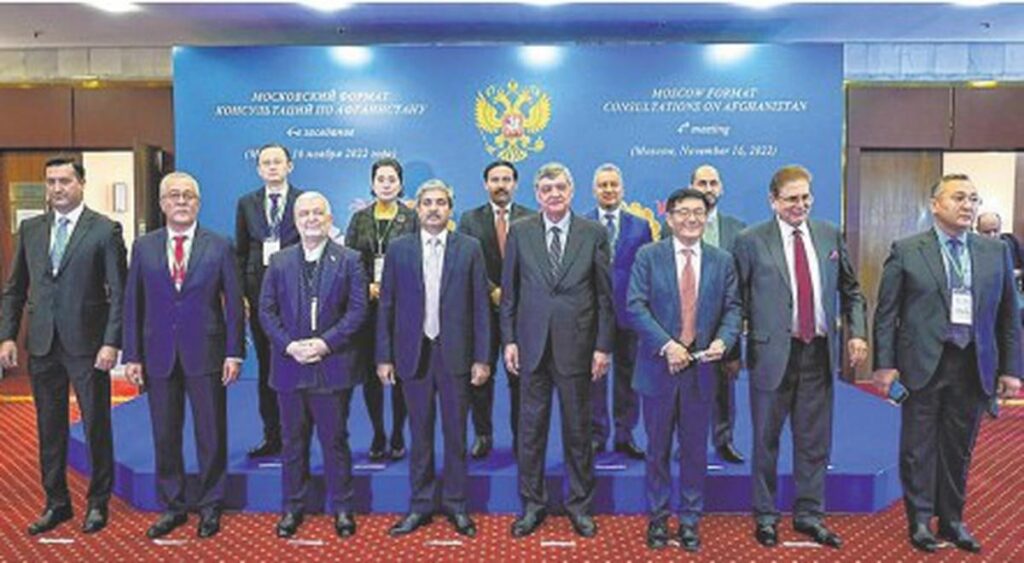In the fourth round of consultations, the participants called for an “inclusive government” and for “national reconciliation” but the Taliban did not promise that it will endorse the Moscow Format’s recommendations and merely recognised the “praiseworthy stance”

In the early days of the Donald Trump administration, as it became apparent that parts of the U.S. establishment had been engaging the Taliban for talks, various other stakeholders activated overt dialogue platforms to discuss the future of Afghanistan. It was against this backdrop that the Moscow Format Consultations on Afghanistan was launched in 2017, consisting of representatives of Russia, Afghanistan, India, Iran, China and Pakistan. It was aimed at ensuring a political settlement, intra-Afghan dialogue and creation of a stable and inclusive government in Kabul after the U.S. withdrawal.
The fourth edition of the format was held in the Russian capital on November 16. The call for the dialogue was given by Zamir Nabiyevich Kabulov, Special Representative of the President of the Russian Federation for Afghanistan. In an article published in Nezavisimaya Gazeta, Mr. Kabulov launched a scathing criticism of the American handling of the Afghan situation as the U.S. banks continue to hold around $9 billion of the Afghan reserves. Setting the stage for another round of the Moscow Format Consultations, Mr. Kabulov said, “Together with our regional partners, we counter this line of the West with efforts to coordinate assistance to the political and socio-economic stabilisation of the situation in Afghanistan, based on the understanding that the true national reconciliation is achievable through the creation of an inclusive ethno-political state leadership.”
Difficult situation
The job is not easy. The Moscow Format’s members are trying to deal with a difficult situation in which they want the Taliban to crack down on extremist and terror outfits inside Afghanistan even though the Taliban have not received global recognition as the de facto ruler of Kabul.
The members of the grouping have varying degrees of concerns regarding the Taliban regime. None of the member countries, in sync with the rest of the global community, has recognised the predominantly Pashtun set-up that replaced the Government of President Ashraf Ghani on August 16, 2021. But almost all the states have engaged the Taliban in security related dialogue. That apart, Russia, China, Iran and Pakistan have maintained diplomatic presence in Kabul.
That apart, Tajik, Kyrgyz, Kazakh, and Uzbek officials have interacted with the Taliban on several occasions ever since the seismic developments of August 2021. India too has sent a special group of officials to Kabul to run the basic functions of the Embassy in Kabul and has been sending large quantities of humanitarian assistance to the country. Prior to this, India had participated in the third round of Moscow Format talks that was held in October 2021 in which an Indian delegation interacted with the Taliban representatives in Moscow.
Both Iranian and Russian missions in Kabul came under repeated attacks recently. China, on the other side, has its own concerns, mainly related to the presence of Uighur militants belonging to the ETIM or the East Turkestan Islamic Movement. The total number of the ETIM fighters are not fully known but it is estimated to have at least 1,000 armed rebels in its ranks who are mostly from the Xinjiang province of China. That apart, China is concerned about the safety of its workers who are stationed in Pakistan and are active in safeguarding the China Pakistan Economic Corridor. So all sides, including India, Russia, China and Central Asian republics want to see a stable solution to the Afghan crisis so that their interests would be protected.
In the fourth round of consultations, the participants called for an “inclusive government” and for “national reconciliation” but the Taliban did not promise that it will endorse the Moscow Format’s recommendations and merely recognised the “praiseworthy stance”. In a curious turn of phrase, the Taliban said it will not allow “any third country to place military facilities in Afghanistan” and hinted at a quid pro quo, saying countries should not “put their land and airspace at the disposal of other countries against Afghanistan.”